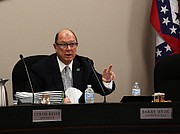Walmart lost its appeal on lowering its Pulaski County tax assessments Wednesday as County Judge Barry Hyde issued a ruling that said reports submitted by the retailer were "fundamentally flawed."
Officials across the state have closely monitored the case, which is viewed by government tax assessors as Arkansas' first serious test of the so-called dark-store theory. The legal argument, which has found mixed success nationally, holds that big-box retail stores should be valued, for tax purposes, as if they are closed and vacant.
Attorneys for Walmart and Pulaski County indicated during a two-day hearing last month that they anticipated an appeal to circuit court. Observers have said both sides are preparing as if the case will ultimately go to the state Supreme Court.
A Walmart spokeswoman did not immediately respond to a request for comment Wednesday. Harrison Kemp of the Little Rock firm Mann & Kemp, who is representing the county, declined to comment.
The case concerns the county's 2017 valuation of eight Walmart Supercenters and two Sam's Club stores at a combined $145 million.
Walmart first sought to reduce the total value to $93.4 million and later slashed the combined value to $74.3 million, which would be a 48% drop from the county's valuations.
About $4.5 million in tax revenue for school districts and local governments is at stake in Pulaski County.
Washington County Assessor Russell Hill, an outspoken opponent of the legal theory, has said that more than $100 million in property-tax revenue across Arkansas would be at risk if the argument prevails.
The term "dark store" barely drew any mention during last month's hearing in Quorum Court, but arguments advanced by Walmart's witnesses hewed closely to the legal theory.
Retailers argue that their buildings are so customized to specific needs that they cannot fetch a price on the open market that is comparable with their tax valuations.
Opponents contend that the alternative means potentially tying the worth of one store to a vacant, misshapen lot in a different state.
Hyde's judgment did not directly address the "dark store" debate. Instead, he found that Walmart's own appraisals were "flawed on multiple points" because of specific steps their private appraiser did and did not take when determining the value.
Hyde also noted that Walmart suggested two sets of values for the 10 properties, first in October 2018 and then in April 2019. The April values were cut deeper than what the company had previously presented.
"Although no proof regarding the values asserted in the initial petitions was presented during the County Court hearings, the pleadings incorporating the previously proposed values raised questions as to the amended lower value being true and correct," Hyde wrote.
"However, even in the absence of these questions, [Walmart] still failed to meet their burden of proof due to their heavy reliance on fundamentally flawed appraisal reports," he continued.
Hyde, who is not a licensed attorney, acts as a jurist when deciding property-tax appeals in county court.
Kemp, in his written final argument for the county, contended that appraisals by Jeff Ford on Walmart's behalf "were prepared negligently" because Ford did not thoroughly investigate whether some of the real estate transactions he used as comparison data were between related parties, such as business partners or family members.
Ford acknowledged during the July hearing that he was unaware whether some of the land-sales transactions he used for comparison were between related parties, which he testified should not be used for comparisons because they don't necessarily reflect actual market prices.
Ryan Wilson, a Jonesboro attorney representing Walmart, had said in his final filing that the "argument missed the mark." The county did not offer definitive proof that the sales Ford used as comparison points were between related parties, he wrote.
Most of the land-sales transactions used by Ford were not identified as potentially being between related parties during the hearing. Even if the questioned transactions were removed from the calculation, it would not have significantly changed his estimates, Ford testified.
In his ruling Wednesday, Hyde additionally found that some "of the comparable properties chosen by Mr. Ford ... were not similar to the properties at issue," citing testimony by Bob Clay of the assessor's office about traffic counts, available utilities and other factors.
Clay, the assessor's supervisor of commercial appraisal, was the county's only witness. His testimony focused on Ford's appraisal reports rather than on justifying his office's original 2017 assessments.
Wilson, representing Walmart, maintained in his final argument that the assessor's office "offered absolutely no documentary or substantive value evidence of their own" and that the hearing should have begun with a blank slate.
"Once [Walmart] put forth sufficient evidence to establish true market value, it was incumbent upon the Assessor to put forth competing evidence to tip the scale the other way," Wilson wrote. "The Assessor simply failed to do so. ... The Assessor merely testified to a difference of opinion regarding certain parts of Mr. Ford's appraisals."
Hyde wrote in his decision that Walmart, as the petitioner, faced the burden of proving the "true and correct market value" of the property.
A Section on 08/15/2019


